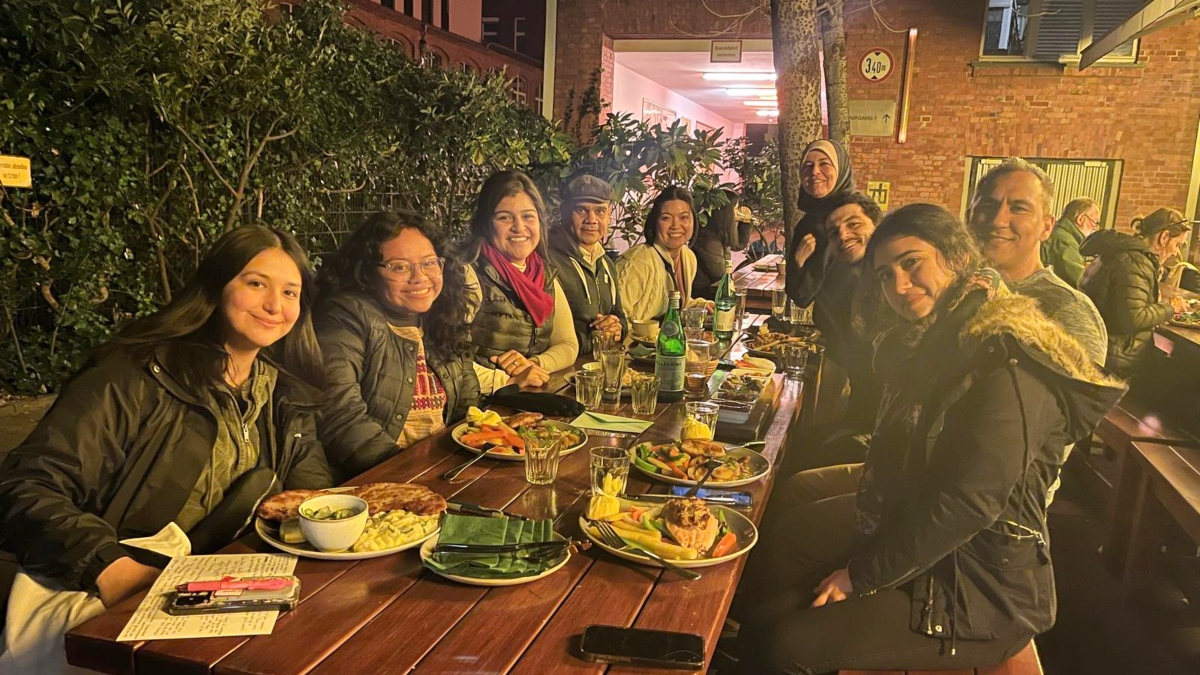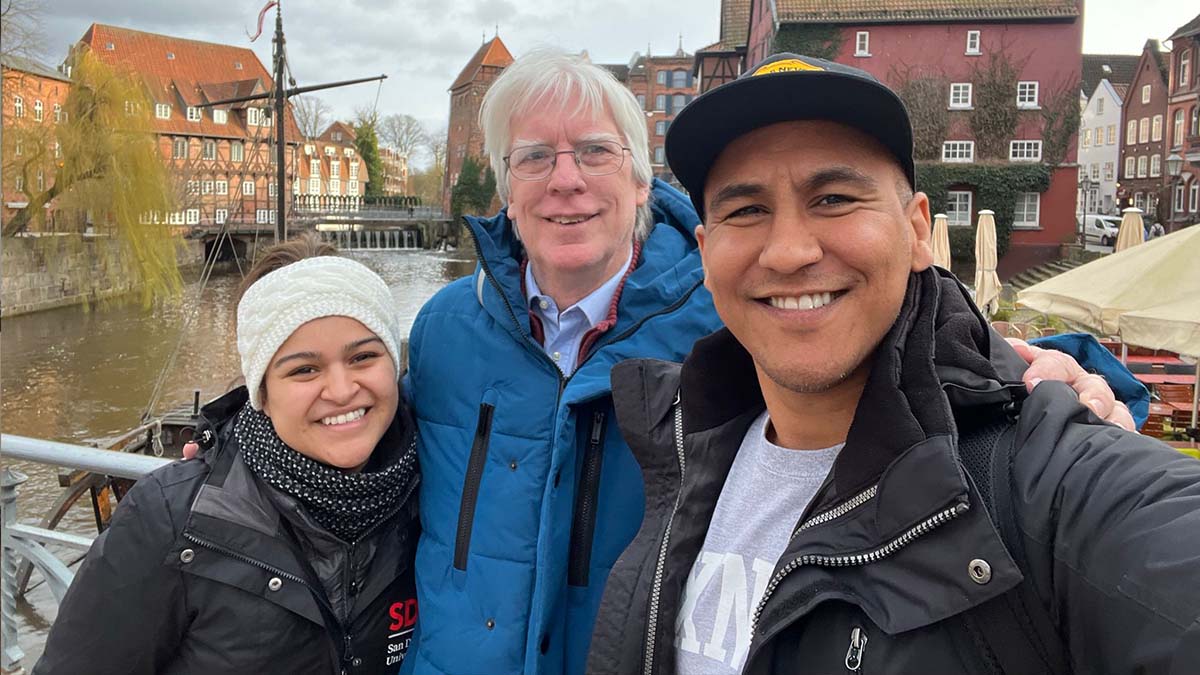Grad Students Travel to Berlin as Part of Push to Expand International Opportunities

Griselda Paredes and Efraín Chávez met a decade ago while they were undergraduate students at California State University, Chico. Early on, Chávez told her all about his experiences studying abroad in Spain and Brazil.
For Paredes, who had never even considered going abroad, the conversations planted a seed.
“I never thought someone like me could study abroad,” Paredes said. “I always worried it would be too expensive and there were also cultural barriers as a Mexican American first-generation student. My parents would be like ‘What are you going to do over there?’
“But upon learning about Efraín’s experience, it became something that I really regretted not taking advantage of.”
Now partners and graduate students in San Diego State University’s College of Education, Paredes and Chávez recently made up for lost time, visiting Berlin as part of a project to engage more underrepresented students in global experiences.
Joined by five classmates and faculty mentor Cristian Aquino Sterling, COE’s director of international affairs and associate professor in the school of teacher education, they traveled to Germany in March to attend the Advanced Research in Education, Teaching and Learning (ARETL) Conference. The experience was grant funded by SDSU’s Student Success Fee (SSF), which enhances student success through expanded academic related programs.
The conference is one piece of a semester-long project led by Paredes, currently a doctoral student in SDSU’s Joint Ph.D. Program in Education with Claremont Graduate University (JDP), and Chávez, a high school teacher in East San Diego County and master’s student in SDSU’s Department of Dual Language and English Learner Education. Their aim is to build connections to support international opportunities for graduate students, connect students to international research opportunities and provide information for students on how to navigate an international professional conference.
“One thing that stood out to me was how you can attend an international conference and have everyone leave with the same goal — creating change and empowerment for the rest of the world,” said Chávez. “It ended up being a small conference with no more than 200 people in attendance, which made it really intimate. I feel like that really helped us connect and build relationships with those professionals in the space.”
While the group spent most of their time in Berlin, attending the conference and exploring the iconic sights, complicated history, rich diversity and eclectic cuisine of Germany’s capital, the group also trekked to Leuphana University in nearby Lüneburg. There they met with Tony Waters — a former Chico State professor of Paredes and Chávez who is now faculty at Leuphana Univeristy — and got a small taste of life at a European university.
“When we were leaving, I was like ‘I should have studied abroad,’” Paredes said, smiling. “I know it kind of sounds nerdy, but I loved engaging in philosophical conversations with other folks, just talking about scholarship or different ideas for research. It was just such a great experience.”
“We're really thankful to San Diego State and Associated Students for the funding, and to the Student Success Fee Committee for believing in this project,” she added. “I also want to mention Claudia Sanchez, the SSF coordinator who is an absolute gem to SDSU.”
Group perspectives
Other members of the Berlin travel contingent weighed in on the experience.
“I must congratulate Griselda and Efraín for obtaining the SSF grant and for organizing the trip in such thoughtful and effective ways. By providing other students with the opportunity to travel to Germany and attend the conference, they not only exhibited collegiality, but indeed demonstrated what it means to be student leaders working from an orientation of ‘servingness’ within an HSI university model. It was an honor to serve as the faculty mentor and to accompany this exceptional group of SDSU students on their journey to learn, engage, and network in a truly international academic setting.”
— Professor Cristian Aquino Sterling“It was inspiring to see the passion and dedication of educators from different cultural backgrounds, and I came back home with a more focused sense of purpose in my own role, especially as a woman of color. It was a transformative experience as it empowered my passion for promoting diversity, equity and inclusion in education, and provided me with new insights and strategies that I want to implement in my career and future research projects, especially my dissertation.”
—Arwa Alkhawaja, doctoral student, JDP“One highlight of attending the 2023 ARETL Conference was the inspiration I got from listening to one of the speakers who presented their research on inequities in the higher education system. This helped me think of possible topics for my master’s thesis as a future graduate student. One thing I am particularly grateful for is the team that I got to travel with. Being surrounded by such a supportive group of people was a huge factor that contributed to the positive experience I had.”
—Maria Shoka, Senior Undergraduate Student, Political Science“Funding underrepresented students to attend educational and cultural experiences abroad is highly needed. Students who are low-income, first-generation and/or students of color have unique experiences and knowledge to contribute to academic discussions abroad. As a first-generation queer Latinx student myself, I had a lot to share about my values as an aspiring educator with other educators from across the globe. Attending the ARETL conference in Berlin, Germany is an opportunity I never dreamt of having access to.”
—Elizabeth Vazquez, Master's Student, Postsecondary Educational Leadership and Student Affairs (PELSA)


